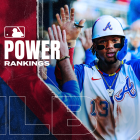Leading up on the announcement of the Baseball Hall of Fame class of 2017 on Jan. 18, we're examining each of the 34 candidates on this year's BBWAA ballot. By way of reminder, a candidate must be named on at least 75 percent of submitted BBWAA ballots in order to be elected into the Hall of Fame.
We've already looked at the numerous candidates who are certain to fall off the ballot after only one year (candidates receiving less than five percent drop off the ballot). Now let's look at those hopefuls who figure to have meaningful support and perhaps even earn induction at some point. Up this time around is longtime Yankees catcher Jorge Posada.
Posada spent all 17 of his big-league seasons in a Yankees uniform. Along the way he caught more than 1,500 games; made five All-Star teams; won five Silver Sluggers; and was part of five World Series champions (although he wasn't on the postseason roster in 1996). In August 2015, Posada received a bust in Yankee Stadium's Monument Park, so his place in franchise lore is secure. But what about a plaque in Cooperstown?
The case for Posada
In addition to his prominent role on most of those Yankees World Series teams of the '90s and '00s (Posada made the playoffs every year of his career except for 2008), it's Posada's production relative to his catching peers that distinguishes him. Across those 17 seasons, he batted .273/.374/.474, which is good for an OPS+ of 121. Along the way, he tallied 275 homers and drew 936 walks. Among those with at least 500 games caught, Posada ranks fifth all-time in on-base percentage, fifth in slugging percentage, fourth in OPS and first in walks.
There is no doubt Posada's bat was special in the light of his manning a premium defensive position for so long. Speaking of which, Posada spent almost 13,000 innings behind the plate. His 1,574 games caught ranks 26th all-time, and he's top-100 all-time in assists as a catcher. Posada's throwing arm was never regarded as an asset, but he wasn't a grave liability in that regard (he threw out 28 percent of would-be base-stealers for his career versus a league-average mark of 30 percent). As well, Posada long drew praise for his handling of pitchers. It's also worth noting that Posada, for all the criticisms of his defense, pinned down the position for a reliable contender for many years.
Mostly, though, the case for Posada flows from the fact that his production at the plate, even after you adjust for the hitter-friendly era in which he played, was pretty special as catchers go. Well, that and all those rings.
The case against Posada
According to the best of our advanced measures, Posada was indeed a bad defensive catcher in pretty much every regard -- controlling the running game, blocking balls in the dirt and framing pitches. Pick your all-encompassing defensive metric of choice, and it likely ranks Posada as among the worst defensive full-time catchers ever. Broadly speaking, that's in keeping with his reputation.
As for the bat, yes, it's very impressive by positional standards on a rate basis, but the counting benchmarks aren't there. Posada's modest 1,664 career hits are particularly lacking by Cooperstown standards. That has a little something to do with the fact that Posada wasn't a lineup fixture until he was 26 years old, but that's not really a point in his favor. Yes, Posada was patient at the plate and drew lots of walks, but making it to the Hall with fewer than 2,000 hits is very difficult. As well, Posada was a terrible base-runner and despite having barely more than 6,000 career at-bats he grounded into 186 double plays, which is the 143rd-highest tally in baseball history. For all the good things Posada did at the plate, he ate away at that value with his defense and base-running.
To put his entire body of work into Hall of Fame context, we'll turn to Jay Jaffe's JAWS system available at Baseball-Reference. Using WAR, JAWS compares a player, in terms of both peak value and overall career value, to those Hall of Famers who played the same position. Posada, we learn, comes up short in career value, peak value and composite value relative to catchers already in the Hall of Fame. That squares with general reputation. There's also not enough in his dossier to overcome such a fundamental shortcoming.
Will he make it?
No. Per Ryan Thibodaux's ballot tracker, we learn that Posada is presently running just 5.5 percent support on ballots. While there are plenty of ballots not tracked and thus room for that figure to change significantly, it's a leading indicator that Posada isn't going to come anywhere close to 75 percent. He has a puncher's chance at sticking on the ballot for at least another year, but he's not ever getting in via the writer's ballot. Posada is the sort of candidate who could benefit from a special committee's estimations many years from now, but that's not going to happen for a while.
Instead, Posada can console himself with what was a darn good career. There's also that fistful of World Series rings and more than $100 million in career salary. Those things should help.
Other Hall of Fame cases: Posada | Ramirez | Guerrero | Rodriguez | Sosa | Wagner | Sheffield






















